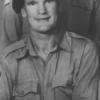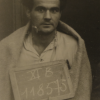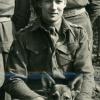This is an extract from the book 'Men of the Red Beret' (1990), Hutchison, ISBN 0-09-173931-4.
Reproduced by the kind permission of the author Max Arthur.
Our task was to force the Germans out of Greece, rather as we had forced them out of the South of France. It was known that they were ready to go but that they needed pushing. We needed airfields there and we needed to try and get right round onto the Balkan flank, to exploit it if the Russians were held up, and if things went wrong in North-West Europe. Mr Churchill always had up his sleeve the idea that we should attack the soft under-belly, through Italy and through Yugoslavia.
After a difficult landing in high winds at Megara we made our rendezvous and began the march into Athens. We had been warned that there was schism between those who supported the old government and the Greek royal family, and a strong vigorous group of communist-led guerrillas, the EAM-ELAS. When we got into Athens, the crowds gave us a colossal reception. I had one of those extraordinary war-time experiences. In the crowd I saw a sergeant in the Commandos who had been a friend of mine in ordinary days, and I just had time to say, 'Good Lord, Stefan, how good to see you – what are you doing here?' We shook hands before the crowd separated us, and I've never seen him again. The Greeks were going mad and the difficulty was to contain and keep together our soldiers; there were a number of very attractive Greek girls trying to secure them for parties, which didn't help.
The three battalions chased after the Germans. The 4th and ourselves (the 6th) were confined mostly to the direct route up north of Athens, while the 5th Battalion went off by sea to Salonika. The 6th Battalion was halted to secure south central Greece. Thebes became the centre of operations. We cleared out small pockets of Germans from the surrounding countryside. I took control of the town of Thebes, and was in effect the military governor, where we did a great deal of initial relief work before the official agencies came. There were two villages where they did not have a single blanket between them nor seed to put in for the following year's growth. We were able to obtain relief supplies and make sure that they went directly to them.
Our work in Thebes was continually hindered by the guerrilla brigade in the area – almost 5,000 in ranks. They were led by dedicated communist officers. They attempted to impose their rule on the villagers, which they had no mandate to do, and to impose a government in the town of Thebes, which we denied them. We succeeded in minimizing their authority, pending some proper arrangements from Athens.
As we came into the winter we were told we would be withdrawing to take part in the next operation in Italy, so 2nd Parachute Brigade was ordered to reassemble in Athens for embarkation. Just after we got back into Athens we were suddenly ordered out quite late at night to round up a body of Greek former guerrillas who were converging on Athens. They turned out to be Colonel Nikiforas (a pseudonym: literally, 'Victorious') and the men we had encountered in Thebes. There was a very unpleasant scene by firelight as we rounded them up and told them to hand over their arms. They did this with great ill-grace until my commanding officer, who had attempted to be friendly, gave an order to our soldiers to put a round in the breech of their rifles. Needless to say they all escaped later from their rather flimsy confinement; quite shortly the whole of Athens was besieged by the communist guerrillas and we found ourselves fighting them and holding them off. In places, we discovered they were arresting civilians arbitrarily, as we had seen happening in Thebes – and killing political opponents and their families whose bodies we later discovered.
In the struggle for Athens, all our three battalions were heavily engaged; the 5th mainly in the Acropolis area, the 6th Battalion in Omonia Square and the 4th adjoining. My own company was at the top of the road to Piraeus, throwing back these people who were trying to push in and take over Athens. During this fighting, OC, C Company was shot through the head, and I, while acting as OC B Company, had been wounded in the arm and chest but had recovered from that. Suddenly, at the age of 20, I was told by my CO to become OC, C Company permanently. I felt a seasoned old soldier. For ten days we remained in defence, fighting at night as much as by day. Then after reinforcement from Italy the whole Athens' garrison began to attack.
We had learnt the technique of mouse-holing – blowing a hole through houses to get at the enemy without going up the street. One morning we were mouse-holing through a chemist's shop and as we went through I saw one or two rogues taking cards of scissors etc. I stopped in the middle of this attack, very vexed, and said to my sergeant, 'Get a hold of your soldiers and have all those goods handed back before we go on another step,' which he rapidly did. The whole war seem to stop for a moment as a reminder of the importance of discipline. We rapidly took our first objective, but then had to get out into the open street, where almost immediately I lost a number of men and the leading platoon commander, a South African called Stofberg. He looked very grey and I saw he had caught a burst of which several had hit him in and around the crutch. I opened his trousers and could see the; rounds had passed through the fleshy inner part of his thighs and I said `Stoffy, it's all right – nothing vital's been hit,' and I was happy to see the grey look pass from him!
We threw out the ELAS, mainly by infantry action, but helped by some of the Sherman tanks which were in the Armoured Brigade – Ark Force. Eventually the ELAS realized they were beaten. Air attacks began on them as they got out into open country, and the battle of Athens was over.
At that time there was a lot of political talk in the UK, including a certain amount in the TUC, that British soldiers were not fighting Germans but were taking on Freedom Fighters who had fought the Germans and had recovered Greece. The General Secretary of the TUC, Vincent Tewson, and one or two others, came out to Athens. The 2nd Parachute Brigade, officers and all ranks mixed, crowded into a theatre in Athens where Tewson said to us all, 'Well lads, I want you to answer these questions. Anybody can get up, irrespective of rank.' He then asked what they thought about putting down the guerrillas. The officers really left it to the soldiers who made it clear that we had not been taking on a gallant lot of Freedom Fighters, but a group who did not enjoy popular support and some of whom were murderers of their own people. Tewson left satisfied.
After we had driven the ELAS back out of Athens, we found places where they had butchered political opponents. Columns of people had been lined up and knives and axes had been used on victims. It was the most horrible and sickening sight and it made a deep impression on many of the soldiers. Thankfully, soon after this the remainder of the 4th Division arrived in relief. We were put into boats and taken back to Italy.
The 6th Battalion's strength was 528 all ranks throughout the fighting in Greece, but we lost 130 of that number killed or wounded badly enough to be taken to hospital — so it was quite tough fighting. We had about three weeks of intense street fighting. The enemy had the advantage of knowing Athens well, and they outnumbered us by about five or six to one. But it would be true to say that we had the advantage of better training and in the Parachute Brigade the quality of the soldiers was absolutely first rate. The fact that we did not give ground at all in our area was one of the main things which made them realize they were not going to get in.
Source: Max Arthur
Read More




Latest Comments
There are currently no comments for this content.
Add Comment
In order to add comments you must be registered with ParaData.
If you are currently a ParaData member please login.
If you are not currently a ParaData member but wish to get involved please register.